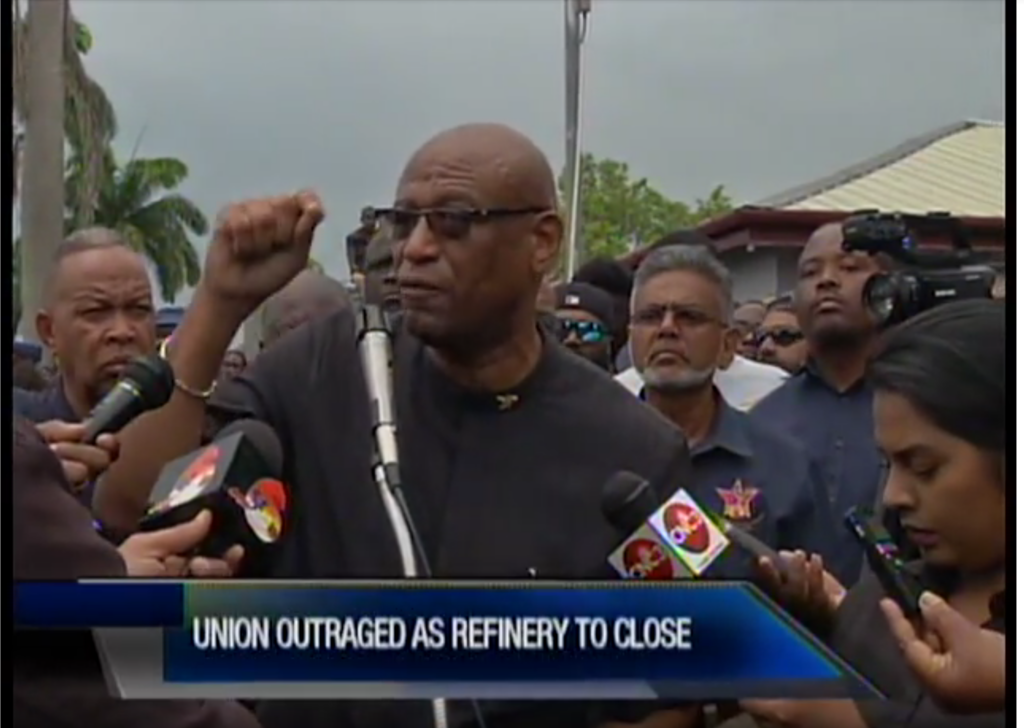29 August, 2018The Oilfields Workers’ Trade Union (OWTU) is opposing plans by the government of Trinidad and Tobago to close a refinery belonging to national oil company Petrotrin, with the loss of at least 2,500 jobs.
On the eve of the 56th anniversary of independence from Britain, the government of Trinidad and Tobago yesterday announced the closure of the country’s only refinery, with the loss of 2,500 permanent jobs at state-owned oil company Petrotrin. The announcement is part of a restructuring plan for the debt-burdened company. All 3,500 workers will be sent home, but approximately 1,000 will be able to reapply for their jobs.
The board of the company met with IndustriALL Global Union affiliate OWTU yesterday. Although the government and company deny privatization plans, union president general Ancel Roget said:
“So you are going to close down the refinery. What do you do with the refinery after? Our suspicion is that after you send the workers home, make a terminalling operation, import fuel at high cost, use foreign exchange to import that fuel, you will then sell in a fire sale. The real owners will emerge….
“This means back to the plantation! Back to being producers of raw materials. We will produce crude, but instead of refining it ourselves, we will sell it. Others will add the value and sell it back to us.”
OWTU has expressed longstanding concerns about the management of the troubled company, and since 2008 has called for the company to be restructured so that the people of the country benefit. Petrotrin is the largest state-owned company in Trinidad and Tobago, and is a mainstay of the economy. However, years of mismanagement has led to a dramatic fall in production and the loss of billions of dollars in value.
Concerns raised by the union include a disturbing number of fatalities and other safety issues, which were not resolved, a lack of investment in aging infrastructure, the corrupt awarding of contracts and political patronage. Megaprojects have run into significant cost overruns, have not been completed in time, and resulted in no perceived benefit.
The union was angered by a statement made by the energy minister, who claimed that the wage bill accounts for 50 per cent of the cost of the highly indebted company. The union has shown that wages cost just 11 per cent, and that the reason for the indebtedness is a legacy of gross mismanagement.
“Trinidad and Tobago with celebrate 56 years of independence from Britain on 31 August”, said union spokesperson Ozzie Warwick.
“But how do you have economic independence if we, the people, do not own the commanding heights of the economy?”
Industrial general secretary Valter Sanches called on the government of Trinidad and Tobago to include OWTU in negotiations about restructuring the company, saying:
This decision would not only destroy the livelihood and welfare of the workers and their communities, but would also take the country back to colonial times.
Ceding of sovereignty—over the exploitation of key natural resources, and the generation of added-value products—to private interest, would run counter to the aspirations of the people and workers of Trinidad and Tobago to consolidate its democracy and achieve sustainable development on its own terms.
IndustriALL calls on its affiliates to show solidarity with OWTU as it struggles the save the jobs of its members, and the assets of the people of Trinidad and Tobago.



